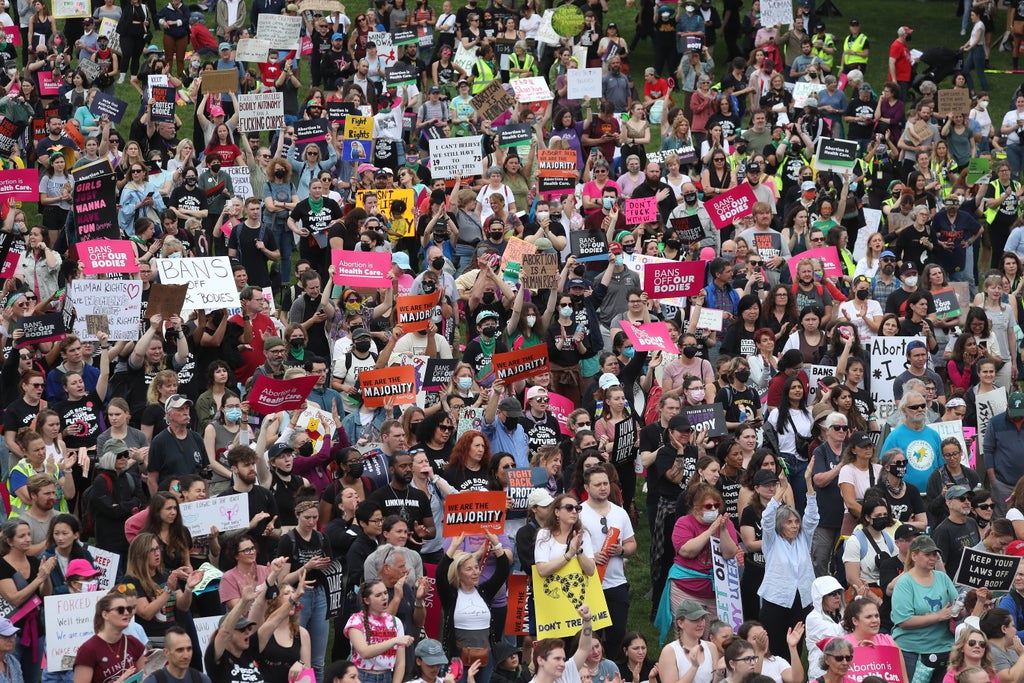
Thousands of people rallied on the National Mall and marched to the US Supreme Court as the court prepares to issue a ruling that could end decades of constitutional protections for abortion care and trigger a wave of laws making abortion illegal in roughly half the US.
Nationwide “Bans Off Our Bodies” rallies brought massive crowds of abortion rights advocates to Washington DC and the streets of New York City, Los Angeles, Austin, Texas and city centres across the US.
National abortion rights groups helped organise rallies in nearly 400 cities and towns, from Cleveland to Oklahoma City and throughout the South from Nashville to Atlanta and New Orleans and across Florida, drawing huge crowds outside state capitols and in city centres in states poised to severely restrict or outlaw abortion access.
“This is a crisis moment,” US Rep Barbara Lee told a crowd in Washington DC. “The radical Supreme Court justices and right-wing extremists are making it clear that they will not stop until a nationwide ban is enacted. But we are here to say loudly and clearly: Keep these bans off of our bodies.”
The rallies demanded support for abortion funds, reproductive health groups, abortion providers, and state- and federal-level protections for abortion care in the wake of a leaked draft opinion from the conservative-majority Supreme Court to overturn the landmark 1973 decision in <em>Roe v Wade</em>and its affirming decision in 1992’s Planned Parenthood v Casey.
A formal decision in Dobbs vs Jackson Women’s Health Organization, the Mississippi case at the centre of the Supreme Court’s Roe debate, is expected in the coming weeks.
Roughly half of US states are set to quickly or immediately outlaw abortion, including 13 states with so-called “trigger” bans in place designed to take effect without overarching federal protections for abortion access.
The Supreme Court heard oral arguments in the Dobbs case in December. Over the following months, a wave of anti-abortion legislation in Republican-led states, emboldened by the forthcoming decision, proposed eliminating abortion access in most cases and criminalising abortion care by making it a felony for providers to see abortion patients.
Within the first few months of the year, legislators in nearly 40 states introduced more than 200 bills to restrict access to abortion.
Meanwhile, four states and Washington DC have codified the right to abortion access, while 12 states explicitly permit abortion care, according to reproductive research organsation Guttmacher Institute.
This week, the US Senate failed to pass a federal measure, the Women’s Health Protection Act, that would codify Roe, with Democratic Senator Joe Manchin joining all 50 Republican senators voting to block debate, effectively killing the legislation.
President Joe Biden blamed Senate Republicans for obstructing the legislation, stressing the urgency to protect “fundamental rights” threatened by the Supreme Court, and said the Senate’s inaction “runs counter to the will of the majority of American people.”
Several recent polls show a majority of Americans support protections for abortion access and upholding the Roe v Wade decision.
“Republicans in Congress – not one of whom voted for this bill – have chosen to stand in the way of Americans’ rights to make the most personal decisions about their own bodies, families and lives,” the president said in a statement.







